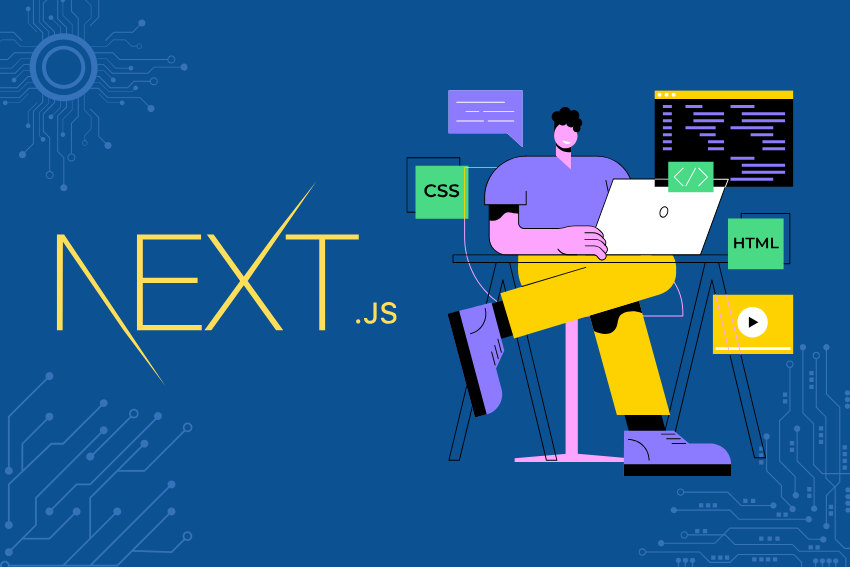The web development landscape is constantly changing, and today is developed towards faster and more scalable web applications. As companies grow, so does their demand for streamlined platforms that enhance the user experience and are optimised for performance. The one recent go-to for all such enterprises has been Next.js, a React-based framework. It gained immense popularity because it simplifies web development while providing rich features to create scalable web applications.
This article explains how developing with Next.js streamlines web development for businesses, why it leads all other frameworks in the market, and how it will help your organisation. Additionally, we have some words about NextJS development services, the possibility of having custom NextJS development services, and the role in developing NextJS web applications.
What is Next.js?

Next.js: It is an open-source JavaScript framework on top of React, allowing developers to create server-side rendering, static websites, and web pages with minimal configuration. Released by Vercel in 2016, known as Zeit, Next.js has been specially built to overcome common difficulties that developers face while building React applications, especially in the areas of SEO, routing, server-side rendering (SSR), and SSG.
Main Features of Next.js:
- Server-Side Rendering (SSR): Pages will be rendered on the server before being sent to the client, improving performance and search engine optimisation.
- Static Site Generation (SSG): Pages are pre-created at build time, so static content loads extremely fast.
- API Routes: You can create API endpoints as part of a Next.js project that might displace the need for an entirely separate back-end infrastructure.
- Auto Code Splitting: JavaScript only loads where needed, meaning the pages will load far faster.
- File-based Routing: No complex routes to set up; you can just create your files in the `pages` directory, and Next.js creates the routing for you.
- Built-in CSS and Sass support: No setup is required to add styles.
- ISR: Incremental static regeneration at runtime. This can be very helpful when content gets frequently updated.
Why Enterprises Would Love Next.js for Web Development
Enterprises usually have particular and advanced requirements for web development. Enterprises require large-scale applications with security, speed, and scalability capabilities. Next.js web development is excellent for enterprises due to competitive benefits that meet the specified needs.
Better Performance and Scalability
High traffic is critical to enterprise applications- and, subsequently, the importance of good performance. Next.js is also particularly renowned for server-side rendering (SSR), which ensures the pages are initialised quickly when needed, where it then renders pages on a server before transmitting them to the client. This feature is crucial for enterprises that wish to enhance their users’ experience and minimise bounce rates.
SEO Optimization
For online-driven businesses, SEO is a must-have. The traditional React applications need better search engine optimisation simply because all their content is rendered on the client side. This can delay crawlers from fetching the content and indexing the website. This issue is no more with Next.js as it allows the rendering of content on the server and sending data to the client. The usefulness of search engine crawlers in accessing the content may lead to enhanced ranking and visibility of the website.
Developer Experience and Productivity
The single biggest win with Next.js development is that it has a smooth developer experience. Next.js abstracts away much of the configuration needed in traditional React projects, which helps developers write less boilerplate code. It provides sane defaults for routing, state management, and API integration, making life as a developer easier, less concerned with configuration and more about building features.
The file-based routing system is a huge time-saver for developers. A developer must create a new file in the `pages` directory to add a new route. For example, if this new file had been named `contact,` the route ` /contact` would automatically be ready without complex route configuration and without risking error.
Flexibility with Full Stack Capabilities
Although most of its usage relates to the development front, it also supports backend functionality via API routes. Thus, enterprises can utilise Next.js to build full-stack applications without necessarily developing server-side technologies separately. One can design API endpoints using the same stack framework, simplifying the development process. It is beneficial if the team focuses on a unified stack; complexity is reduced, and communication between front-end and back-end teams can be improved.
Robust Ecosystem and Community Support
Next.js leverages the deep React ecosystem, which has many libraries, tools, and frameworks that developers can utilise. Since React is very popular, Next.js has a massive community of developers working on its ecosystem. Be it custom NextJS development services or using third-party plugins; it does not matter as there will be some tools to enhance the functionality of Next.js.
Any Industry Can Use It
Next.js can be used in any commerce, healthcare, finance, and technology business. Its versatility has made it capable enough for developers to create custom NextJS web applications according to specific business needs. For example, a finance firm may create an exact data-driven dashboard with dynamic content, while an eCommerce site might use static page generation on the product listings.
How Custom NextJS Development Services Improve Business Solutions
With the growing enterprise adoption of NextJS web applications, custom NextJS development services are gaining preference as a means of creating business solutions specifically designed for the needs of an enterprise. Custom NextJS development services generally provide a customised implementation, development of specific features, and optimised techniques that propel NextJS to go beyond its ‘out-of-the-box’ capabilities.
Solutions for Specific Business Challenges
Custom development services give organisations the best solutions regarding business logic and user requirements. For example, an enterprise may require a custom payment gateway or integration with an internal CRM system. With custom NextJS development services, you can create APIs or server-side logic that integrates with your existing systems.
Enhanced Security Measures
Enterprise web applications handling sensitive data make their security a top priority. Custom development services can include specific levels of protection in an application, such as multi-factor authentication, secure payment gateway, and advanced encryption techniques. Ensuring customer data safety and regulatory compliance leads business houses to avail of NextJS development services where these security measures can be implemented.
Optimization for Applications at Big Scale
These are millions of users for enterprises, so web applications need scalable development without compromising their performance. Custom development services ensure that applications are optimised for performance through caching strategies, database optimisation, and efficient load balancing. Developers can ensure good web application performance even under heavy traffic if they tailor it to the enterprise’s needs.
Role of NextJS Development Service in Enterprise Success
For enterprises that want robust and scalable web applications, NextJS development services can be a strategic advantage in the right direction. Well, these services provide a more holistic approach that goes beyond building websites. They can help an enterprise implement the right architecture, optimise performance, and ensure long-term scalability.
Expertise in Complex Implementations
Though Next.js is quite a robust framework, its full potential can only be reached with the proper expertise to develop complex enterprise projects. The development services of NextJS specialise in competent developers who know what making the case with Next.js means for large-scale multi-functional applications. Advanced routing strategies, integrations with API, and server-side rendering optimisations are delivered on time through the efforts of such experts.
Continuous Improvement and Support
Continuous support and development are necessary for enterprises to get their applications updated. It may be in maintenance, security updates, or feature enhancements. Such resources will ensure that your web application keeps up with the pace and is at the top. Partnering with a NextJS development service provider enables enterprises to create an optimised application for performance, security, and user experience.
Cost Efficiency and Time Savings
Building a web application from scratch will always be time- and cost-consuming in terms of traditional development approaches. However, NextJS development services cut down on time and cost while leveraging the frameworks’ built-in efficiencies to scale up an enterprise-grade web application. The need for manual coding is thwarted in many places by automatic code splitting, server-side rendering, and file-based routing. It saves development cycles faster and reduces overall costs for enterprises.
Seamless Third-Party Integration
For business concerns, third-party tools and services are a godsend. Be it integrating payment gateway, CRMs, cloud services, and analytics platforms, Next.js is flexible enough to connect with a great range of APIs and external services.
Cross-Capabilities
With the need to access enterprise applications by different forms of clients in varying platforms such as web, mobile, and even desktop, enterprise applications must accommodate more than one platform. Although Next.js is a web framework, cross-platform development is now viable through integration with React Native. Enterprises, therefore, can capitalise on Next.js development for web and mobile applications with the same user experience across platforms.
Robust Data Handling and Real-time Capabilities
Many business applications must process large amounts of data effectively and sometimes in real time. Pairing Next.js with WebSockets, GraphQL, or serverless technologies can provide powerful answers to real-time data processing. NextJS web applications may be used for dashboards, financial trading platforms, or live communication tools, for example, whose real-time updates occur.
Using Next.js in Enterprise
Several international companies have successfully used Next.js in their web applications, promising an opportunity to achieve scalability, performance, and ease of use.
eCommerce Platforms
For example, Twitch and Nike are their eCommerce platforms. They create dynamic, fast-loading websites and keep millions of users since the performance benefits come from server-side rendering and static site generation. At the same time, following js flexibility allows for complex features to be maintained, such as a real-time possibility to create personalised content and availability for products and a smooth checkout process.
Platforms for SaaS
The SaaS companies’ performance and scalability significantly depend on the next.js web application. Vercel, Hulu, and GitHub are big enterprises that have used Next.js to build gigantic, interactable applications that can support thousands of users and complex workflows in real-time. With flexible development in NextJS web applications, it is suitable for highly interactive SaaS building and includes features such as user dashboards, content management systems, and real-time collaboration tools.
Content-heavy Websites and Blogs
Next.js features of static site generation and incremental static regeneration will benefit media and publishing companies like The Washington Post and the New York Times. With these features, content-heavy websites can pre-render pages at build time. Even with voluminous content, they can still enjoy fast load times.
Financial Institutions
Security, scalability, and performance are very critical to financial organisations. Companies such as Bloomberg and Capital One utilise Next.js to build web applications that can potentially require real-time data visualisation, intricate user workflows, and advanced security features.
The Future of Next.js in Enterprise Web Development
The features within Next.js are continually evolving and improving, with both Vercel and the open-source community adding new features to the platform. This makes it an enterprise-grade solution to ensure enterprises build scalable, secure, high-performance web applications.
NextJS development services will expand as businesses find out the benefits provided by the framework when making sometimes complicated web development processes easier. From eCommerce to SaaS platforms, financial services, and so much more, Next.js versatility and strength make it the go-to choice for enterprises hoping to stay on top in an increasingly digital world.
Key Areas of Future Growth:
- Next-generation static site generation: Next.js will take static site generation to the next level by creating more complex static pages that can deliver real-time data for most enterprises.
- Integration with serverless architecture: Next.js will benefit from the pervasive use of serverless architectures; therefore, deeper integration with functions-as-a-service would help improve Next.js’ scalability and performance.
- Advanced Developer Tooling: Since Next.js has an active and vibrant community, better developer tooling and more libraries will be offered, making it easier to adopt and maintain for enterprise organisation web applications.
- Embedding AI and Machine Learning: With the gaining interest in AI, Next.js might now integrate itself with machine learning libraries and tools so that businesses can implement intelligent features in their web applications.
Conclusion
The fast-speed digital world requires web development frameworks that provide scale and security optimise performance, and simplify development. Next.js web development has become one of the top contenders with everything that can cater to an enterprise’s needs to build highly high-performance web applications with minimal complexity.
From its server-side rendering and static site generation, emphasising performance and importance to SEO and developer experience, NextJS web applications have become a scalable solution for enterprises of all sizes. Investing in NextJS development services make businesses feel confident that they are building future-proof and scalable web applications.


